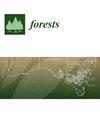意大利半岛、西西里岛和撒丁岛白橡树种群的叶绿体单倍型多样性
IF 2.4
2区 农林科学
Q1 FORESTRY
引用次数: 0
摘要
为了确定意大利半岛、西西里岛和撒丁岛内可能存在的单倍型结构分布,我们对天然白栎林(柞树亚属、柞树科)的叶绿体 DNA 进行了系统地理学研究。研究考虑了属于 Q. frainetto、Q. robur 以及 Q. petraea 和 Q. pubescens 的 60 个白栎种群,并结合 5 个叶绿体简单序列重复(cpSSR)标记进行了分析。共检测到 28 个单倍型。意大利中部和南部的变异性最高(分别为 14 个和 10 个单倍型),其次是意大利北部(7 个)、撒丁岛(7 个)和西西里岛(5 个)。单倍型分布呈现出复杂的地理结构,突出表现在:(i) 低频率单倍型数量较多;(ii) 撒丁岛明显与世隔绝;(iii) 单倍型广泛分布于整个意大利半岛;(iv) 西西里岛独有的单倍型以及与撒丁岛和意大利半岛其他地区共享的单倍型。研究还发现,单倍型的分布与标本的分类学特征有部分关系,并呈现出以下特征:意大利中部和南部的 Q. frainetto 种群之间存在地理分隔,卡拉布里亚和西西里的 Q. petraea subsp.austrotyrrhenica 种群之间存在意想不到的不连续性,意大利中部和南部的 Q. pubescens 种群之间缺乏最常见的单倍型。本文章由计算机程序翻译,如有差异,请以英文原文为准。
Chloroplast Haplotype Diversity in the White Oak Populations of the Italian Peninsula, Sicily, and Sardinia
A phylogeographic study on the chloroplast DNA of natural white oak forests (Quercus subgen. Quercus, sect. Quercus) was carried out to identify possible haplotype-structured distribution within the Italian Peninsula, Sicily, and Sardinia. Sixty white oak populations belonging to Q. frainetto, Q. robur and the collective groups Q. petraea and Q. pubescens were considered and analyzed by combining five Chloroplast Simple Sequence Repeat (cpSSR) markers. A total of 28 haplotypes were detected. Central and southern Italy displayed the highest variability (14 and 10 haplotypes, respectively), followed by northern Italy (7), Sardinia (7), and Sicily (5). A complex geographical structure of the haplotype distribution emerged, highlighting (i) a high number of low-frequency haplotypes; (ii) the marked isolation of Sardinia; (iii) the occurrence of haplotypes widely distributed throughout the Italian Peninsula; (iv) the idiosyncrasy of Sicily, which exhibits exclusive haplotypes, and haplotypes shared with Sardinia and the rest of the Italian Peninsula. The haplotype distribution was also found to be partially related to the taxonomic identity of the specimens, with the following features emerging: a geographic separation between the central Italy and southern Italy Q. frainetto populations, an unexpected discontinuity between the Calabrian and Sicilian Q. petraea subsp. austrotyrrhenica populations, and the absence of the most common haplotype among the Q. pubescens populations of central and southern Italy.
求助全文
通过发布文献求助,成功后即可免费获取论文全文。
去求助
来源期刊

Forests
FORESTRY-
CiteScore
4.40
自引率
17.20%
发文量
1823
审稿时长
19.02 days
期刊介绍:
Forests (ISSN 1999-4907) is an international and cross-disciplinary scholarly journal of forestry and forest ecology. It publishes research papers, short communications and review papers. There is no restriction on the length of the papers. Our aim is to encourage scientists to publish their experimental and theoretical research in as much detail as possible. Full experimental and/or methodical details must be provided for research articles.
 求助内容:
求助内容: 应助结果提醒方式:
应助结果提醒方式:


